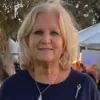Shanise Pearce says the scary words out loud.
Cancer. Breast cancer. Chemotherapy. Mastectomy. Survival rate. These are some of the words that have defined her life since 2023 when she was first diagnosed with the especially aggressive triple-negative breast cancer.
But other words that define the life of the Pataskala mother of three, age 45, are survivor, educator and advocate. Since her diagnosis, Pearce has thrown herself into educating the Black community, and anyone else she can, on breast cancer.
Black individuals have the lowest survival rate of any racial group for most cancers, according to the American Cancer Society (ACS). Black women are 40% more likely to die from breast cancer than white women, and also are diagnosed with triple-negative breast cancer at twice the rate of white women.
“What Shanise is doing is she is putting a face to the diagnosis of breast cancer, particularly triple negative. She is showing people that you don’t have to be afraid,” said Kimberly Saxton, director of nursing for the Stefanie Spielman Breast Center and fellow advocate. “You put a face to it, and you realize, like, oh, I can get through this, and I can get through this successfully.”
Genetic testing and two pencil-sized dots on an MRI
Predicting the future isn’t among Pearce’s many talents, but to a degree, she could see her cancer coming.
Due to a history of uterine cancer in her family, Pearce wanted to get an elective hysterectomy. Her doctor told her they would need to do some testing before they could approve it. One cheek swab later in 2020, Pearce’s life changed.
The doctor told her she had the PMS2 and BRCA2 gene mutations. Everyone has a form of these genes, but with the mutation, a person is at a much higher risk of developing breast, ovarian and other cancers than those without them. The reasons why are still being explored.
Pearce started seeing specialists for preventative care, undergoing more frequent health screenings than an average woman her age for her breasts, abdomen and skin. She got that hysterectomy as a precaution and was considering a double mastectomy to minimize breast cancer risk. But in January 2023, two pencil-tip-sized dots showed up on an ultrasound. A biopsy confirmed it was stage one triple-negative breast cancer.
Without that genetic testing, Pearce questions how long it would have taken her to catch her breast cancer. She’s also been able to help her family better understand their bodies and their own health risks, including her siblings and children.
After Pearce discovered her genetic mutations, she encouraged her daughters, both in their 20s, to get testing. Her daughter Naomi carries one of her mother’s mutations, and her daughter Shadé carries both. They’ve since been set up with specialists for preventative care twenty years ahead of their mother.
“I was scared to do the actual genetic testing, but with my mom just pushing it and saying how important it is to be aware of what’s going on in your body, so that it can save your life, it made me want to be more educated about it,” Shadé said. “Even though it was very hard for me to process, I want to be more aware so that I can prevent going through what my mom went through.”
Pearce hopes that educating others on access to genetic testing will increase preventative care and early detection, especially for Black women, who are more likely to be diagnosed with later-stage breast cancer than white women. Medical experts say this is due to a multitude of factors, including social determinants of health like income, regular care access, structural racism and a historical mistrust of the medical community.
More:Overcoming racism, redlining and more, Columbus officials push Black health progress
“It’s crucial and critical for Black people to understand that you can have a good relationship with your medical team. That’s something that we don’t typically have in our culture,” Pearce explained. “There’s a lot of scarring there from issues in the past. My vision at the advocates’ table is to give back to the community so that it understands that we deserve to live.”
“My living legacy.”
After 12 rounds of chemotherapy and a double mastectomy, doctors declared Pearce cancer-free in 2024.
Now in 2025, Pearce sits on boards for the American Cancer Society and Susan G. Komen foundation and often speaks and educates on their behalves, including at the Ohio Statehouse. She’s also a staunch ambassador for ACS’s VOICES of Black Women project.
ACS’s goal is to survey 100,000 Black women between ages 25 and 55 who have not had a cancer diagnosis across the U.S. to increase understanding of Black women’s health amid sharp racial health disparities in Ohio and the United States as a whole.
“We’re really calling on Black women across the country to use their voices to make this change,” said Isabelle Castillo-Anderson, senior development manager with ACS. “[The study] allows participants to also think about their own circumstances and changes that they might be able to make. Many of these women have signed up to improve generations of Black women. How many of them will also change their own lives just through the information that they’re able to access through this?”
Pearce currently works full time but hopes to one day switch her day job to full-time advocacy.
“There’s just so many things that I’m passionate about with spreading awareness that I feel like, yes, cancer has happened to me, but it has also happened for me,” Pearce said. “I found my purpose, and this is now my living legacy.”
Samantha Hendrickson is The Dispatch’s medical business and health care reporter. She can be reached at shendrickson@dispatch.com
If you are interested in participating in the VOICES study, you can find more information here.



